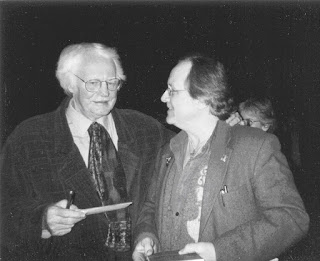Dr. Siluk, with Robert Bly, 2005 (World Theater, St. Paul, Minnesota)
Death throws a shadow on the old Poet, Robert
Bly—who lived his dream of poetry, unevenly, per near a century. He’s a rock
turning sand, like all old men: now with hollow legs, and arms like bacon.
When he is gone, the trees and the leaves and the grass and the wind
that rustles through his old farmlands, will recite his poetry: and all of him
that will be left will be those old warn out paths, he once walked. That will
be his legacy—like a chimney with no smoke.
#3852 (4-18-2013)
Note a: here we have figurative language: meaning,
words used for something you don’t really mean “…hollow legs, and arms like
bacon” and of course other forms of language are used here as in trees and
leaves and grass reciting his poetry, which we know can not. Here the poetic prose is centered on a poet,
as the mind spontaneously expresses for effect, layers of his meaning—in
essence, an elegy before its time; let’s call it a tribute. . People get
obsessed with structure and in doing so, lose the soul of the poem, or the
effect which is the main event. Here the poem says what the poet wants it to
say. We see 21-words with o’s, and the poem is only 87-words long. Not it, its
or it is, which makes often times for a jagged read. The er, ar’s, re’s, ra’s make for a strong read
also (ten words; six of the seven sentences)—connecting from one line to the
next. Note 2: the poet here uses
personification, and reverses it: thus, giving natural objects attributes
represented of person, where normally it is the reverse: “the trees…leaves.
Grass…will recite…” Also the author, poet uses a figure of speech, that
represents death “…a chimney with no smoke,” perhaps we can call it the making
of a simile. Both poets have met on one occasion, in 2005.

